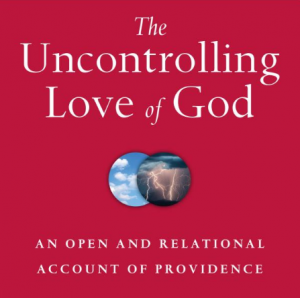In a previous post we looked at Thomas Jay Oord’s sketch of theories of providence —
1. God is the Omnicause.
2. God empowers and overpowers.
3. God is voluntarily self-limited.
4. God is essentially kenotic. [Oord’s view]
5. God sustains as impersonal force.
6. God is initial creator and current observer.
7. God’s ways are not our ways.
Then a second post explored what “open and relational theology” is all about and today we we want to look his defense of #4, the “kenotic” theory of God’s providence. [By the way, I think “uncontrolling” love could be slightly improved with “non-controlling” love of God in the title.]
Here is a major point of theology: it can be said that in many forms of theology what is most primary about God’s essence is God’s sovereignty (e.g., some forms of Calvinism) or God’s holiness (some theologies that centralize propitiation theory), but Oord’s contention is that what is most primary is God’s kenotic love. Depending on how one defines such terms one’s theology flows directly. Open theology, however, can begin with sovereignty (God’s power to choose not to know or not to involve himself in creation) or love (God’s love determines God’s power).
Everything hinges in this chapter — in Oord’s thesis — on kenosis as a central category and, though one could quite simply dispute his definition of kenosis on historical grounds (the term has a “container” image at work somehow but in metaphorical shape), his fundamental definition of love (which differs from some of Oord’s definitions of love) can stand apart from kenosis. So what does kenosis mean to Oord?
Scholars also debate how best to translate the word kenosis. While most believe it tells us something true about God, no one knows precisely what the word means. Kenosis sits in the midst of what biblical scholars believe to be a poem or hymn, and this genre allows for an especially wide range of interpretations. Scholars interpret kenosis variously as “self-emptying,” “self-withdrawing,” “self-limiting” or “self-giving.” 156
Kenosis is not “a divestiture of something,” says biblical scholar Michael Gorman. Relational language, rather than container language, is more helpful if kenosis pertains primarily to love. 156
These three interpretations of kenosis—self-emptying, selfwithdrawing or voluntary self-limitation—present significant problems. 158
Having set out the options and then not agreeing with them, he proposes this for kenosis:
[He proposes that kenosis means] “self-giving, others-empowering love” (159).
God didn’t just act kenotically in Christ. Rather, God is kenotic love.
Essential kenosis considers the self-giving, others-empowering love of God revealed in Jesus Christ to be logically primary in God’s eternal essence. 160
And that means, of course, that “God is not free to choose whether to love because God’s nature is love” (161). God is and always acts in kenotic love — that is, God is essentially love and God’s love is essentially kenotic. But God’s how of acting in kenotic love is an act of freedom.
Essential kenosis says, however, that God freely chooses how to express love in each moment. God is free in this important sense. In each moment God freely chooses to love one way instead of another because multiple options are available. God is free when choosing among possible ways to promote shalom. 162
It is at this point that Oord differs with John Sanders, another open/relational theist. Oord thinks Sanders’ view is not sufficiently love-in-essence. But not with Oord:
Love is God’s preeminent attribute. God’s kenotic love logically precedes divine power in the divine nature. 162
This kenotic love in the essence of God then limits all else about God’s relations: God’s power is limited by love: “Essential kenosis says limitations to divine power derive from God’s nature of love” (164). God’s love is shaped toward each person: “Divine love is tailor-made for each creature in each instant” (166).
Which must mean this, and this one is big: “God cannot unilaterally prevent genuine evil” (167) and “Absolute sovereignty is absolutely unbelievable” because there are limits to God (168).
It is at this point that I would have a question, but first Oord’s own formulation:
Essential kenosis says God’s self-giving, others-empowering nature of love necessarily provides freedom, agency, self-organization and lawlike regularity to creation. Because love is the preeminent and necessary attribute in God’s nature, God cannot withdraw, override or fail to provide the freedom, agency, self-organizing and lawlike regularity God gives. Divine love limits divine power. 169
My question is this: Are these then prior to kenotic love? If so, is God essentially kenotic love?
Here are some reasons he gives for this kenotic love theory giving a better theory of providence and evil:
First, this model of providence says God necessarily gives freedom to all creatures complex enough to receive and express it. 170
Second, essential kenosis explains why God doesn’t prevent evil that simple creatures with agency cause or even simpler entities with mere self-organizing capacities cause. 171
He develops this more:
Realizing that God cannot unilaterally prevent suffering caused by simple entities helps us make sense of suffering caused by natural malfunctions or disasters. This means, for instance, we should not accuse God of causing or allowing birth defects, cancer, infections, disease, hurricanes, earthquakes, tsunamis, or other illnesses and catastrophes. The degradation brought by such calamities does not represent God’s will. Instead, we can blame simple structures, various natural processes of the world, small organisms or creation gone awry. Because God’s self-giving, others-empowering love makes agency and self-organization possible, God is not culpable for the evil that less complex entities cause. 172
Third, Essential kenosis helps us make sense of the random mutations, chance events and accidents that cause evil. 173
So he sums up his argument with this: “If God’s love cooperates rather than controls, never forces its way on the beloved and risks rather than imposes guarantees, love as the logically preeminent attribute prevents God from entirely determining others. An essentially loving God who could totally control others does not exist because God s love cannot control” (180).






